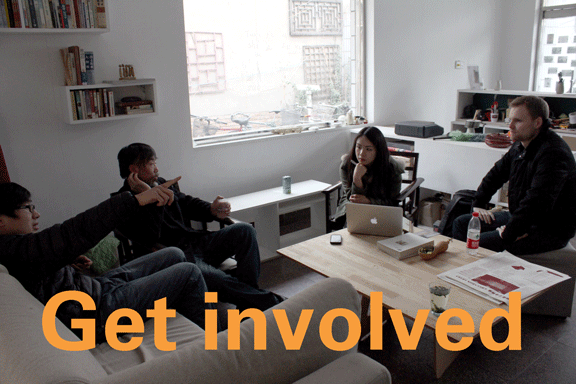
Two interviews in 3 days in March by Asta of Peking University, and photographer and writer Lo Yin Shan. Is this community-based practice?
In the springtime HomeShop had a few visitors, as well as some very curious though inevitable vacancies (including the seeming concerted evaporation of occupants from the workshare space a month ago; now much ameliorated). During this time, and facing an uncertain future, a number of us began considering our established models of supporting and running the space. A discussion among various Beijing-based art spaces and projects also attempted to find some answers to the question of what kinds of activities are felt to be needed now in this city, and how they could be sustained.
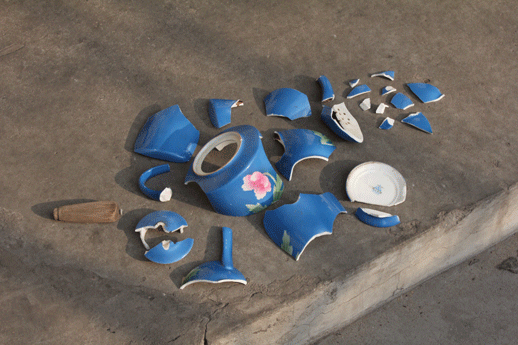
On a return, the Teapot Exhibitions space was found to have been shattered to pieces, December 2012.
For a brief moment, following the positive experience of having UK-based artist Maurice Carlin here as first “official” resident, the idea to pursue a residency program seemed like a good way to regularly fill space and provide some inquisitive new energy, as it keeps many a Beijing institution afloat or well-padded. We consulted our friend at a space in Caochangdi to hear about how their program is run, but found that—however viable such an option might turn out—in our case it would veer down a path of specific identity and program that few of the organizers at HomeShop were really willing to adjust to. Add to that the preparation time required, and we would be looking at the rest of the year singularly geared to making this transition to something we didn’t necessarily feel consensus about achieving.
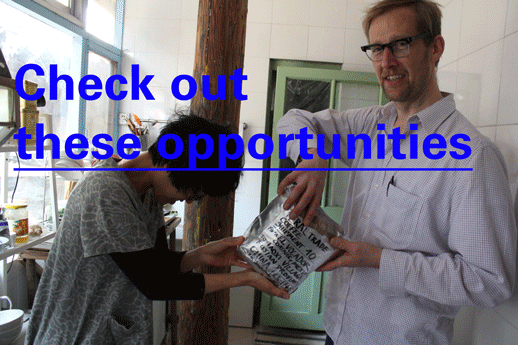
Reinaart Vanhoe and Maurice Carlin each sojourned in HomeShop, April/May 2013.
Likely an existing truism: many of the awkward feelings come from more than the reality of money, but from inside the organizational structure itself. Personal relations ripple through everything we do as a group, as well as all the effects palpable to others. And to us, or to me, at least, it hasn’t always been a desired separation, us and others. But how many others? And who? On that cusp of inside and out, the question of who gets to say, who gets to decide, has never been quite satisfactory to many. “Business” and “art group” sections were proposed at one meeting that seems like ages ago; institutional affiliations too; not to mention suggestions of becoming a real shop or a gallery. (Even old Uncle Long Beard came by one day to ask about starting a restaurant in the front space—if not at our friend’s place across the hutong, which looked empty to him.)

A curious neighbour ponders the latest question on the 問題 blackboard, May 2013.
The physical and social scale of HomeShop seems perfect for trying out the sticky substance of collaborative authorship, but each move has been prone to all the foibles and concentrations of skills and interests particular to the individuals involved. We could say this is natural, but it essentially means a certain recurring, quasi-naturalized predisposition of roles.
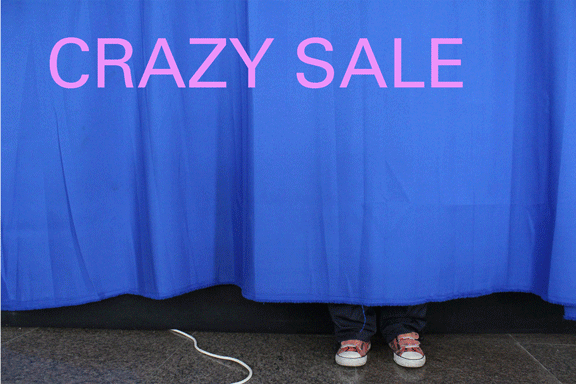
The Party Project does portraits! And political parties! Find out more! Ongoing deal!
This is me editorializing—when my tone turned whiny, another recent returning visitor, Reinaart Vanhoe, recommended giving space and recognizing the specific qualities of the individuals involved. This is true. If part of HomeShop’s character these last couple of years (regardless of which direction it goes in) might have been in prioritizing the values that exist in between those frequenting HomeShop, this may also be seen as its radical difference from many other spaces, organizations, and groups in Beijing. This is also what has left it open to critiques of opacity, inwardness and lack of structure; at the same time, this is what makes it exhausting and insecure. It’s a fiction.
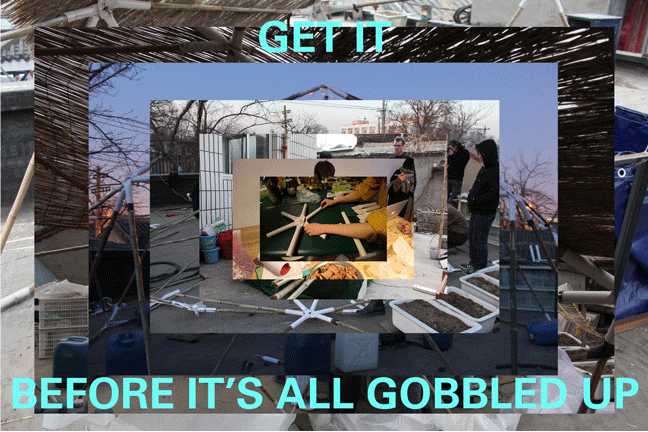
The Aquaponics Workshop, started in early Spring 2013, is finally achieving system operation, with fish on the way any week now!
Giving space: how to understand that at this point? A time that oscillates between a feeling of latter-day busywork and a sense that we are only now achieving certain promises embedded in this inhabitation of HomeShop? Ambiguity and ambivalence sit side by side in the shopfront window with all its virtuality, while this discussion on giving space is for the most part conducted behind closed doors (like this one). In such discussions we talk about what will happen next year when the space’s contract meets its maker. Sometimes it feels a decision has already been made, and sometimes it feels that oscillation has produced the possibility that this decision is not up to us. It might appear in the question, will this given space be missed? or maybe rephrased as, who wants to take it? The offer is there.
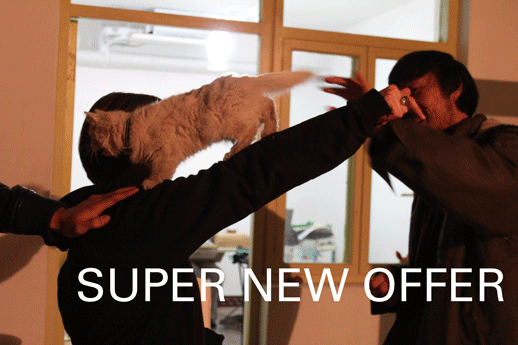
Pointy, circa 2011, one of the many errant cats who have lived and loved and left HomeShop.
*Fine print: Taking the given space wouldn’t be a deal made for survival. In any case, debts may be incurred, facilities and signatures may be withdrawn, free labour may be cut back partially or in whole, and name may be subject to change. Then, you ask, what is offered, exactly? What is it without those things, and what can it become? If you’ll excuse the slippery language, what would be circumscribed by a survivability clause would be a set of possibilities, a certain kind of ground for particular approaches to say, art, design, critical engagement, social organizing, self-determination etc. to come into their own forms. Survivability in a sense meaning, to live beyond the lives of the individuals involved. Again, this is not about legacy, nor about feeling good about taking exits—it is about seeing that value is held by more than this current group of individuals, and recognizing the limits of these individuals in giving space.
My friend, a plurality is on offer! The Beijing wind is on offer!
**Disclaimer: these statements (which are actually questions) are the responsibility of the author and do not reflect the views of HomeShop; no offer is valid unless expressly stipulated by HomeShop.
***Note: This text was written several months ago but put on hold pending a host of unresolved questions that may have caused confusion about what was really being addressed here. At the present time, there are indeed more open discussions about the uncertain future and ways to confront the realities of rising rents, authorship, structure, and cooperation. If you are interested in joining this discussion, get in touch! More people are needed. More info on that soon…
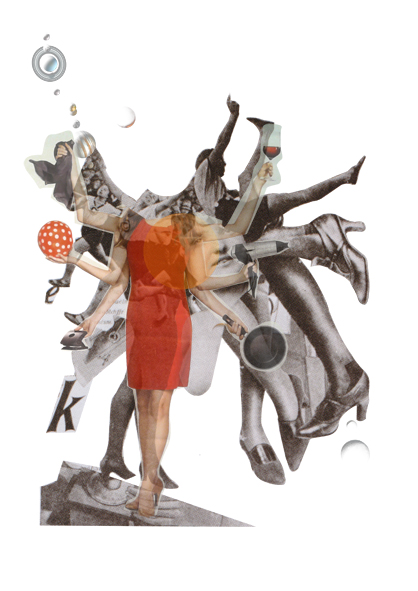

 时间 posted on: 14 October 2013 |
时间 posted on: 14 October 2013 |  发布者 author:
发布者 author: 
 分类 filed under:
分类 filed under: 





